人教新目标八年级下学期Units1 -5 期中语法复习课件(共40张PPT)
文档属性
| 名称 | 人教新目标八年级下学期Units1 -5 期中语法复习课件(共40张PPT) |  | |
| 格式 | pptx | ||
| 文件大小 | 5.9MB | ||
| 资源类型 | 教案 | ||
| 版本资源 | 人教新目标(Go for it)版 | ||
| 科目 | 英语 | ||
| 更新时间 | 2024-04-16 17:37:44 | ||
图片预览

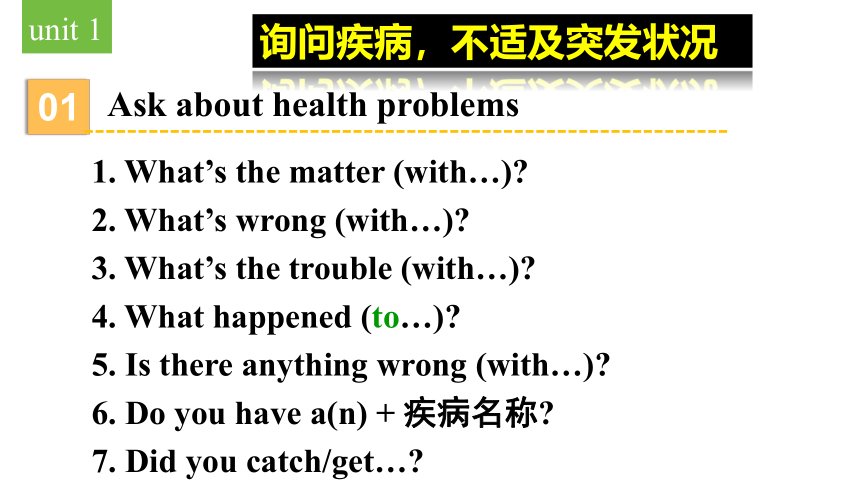
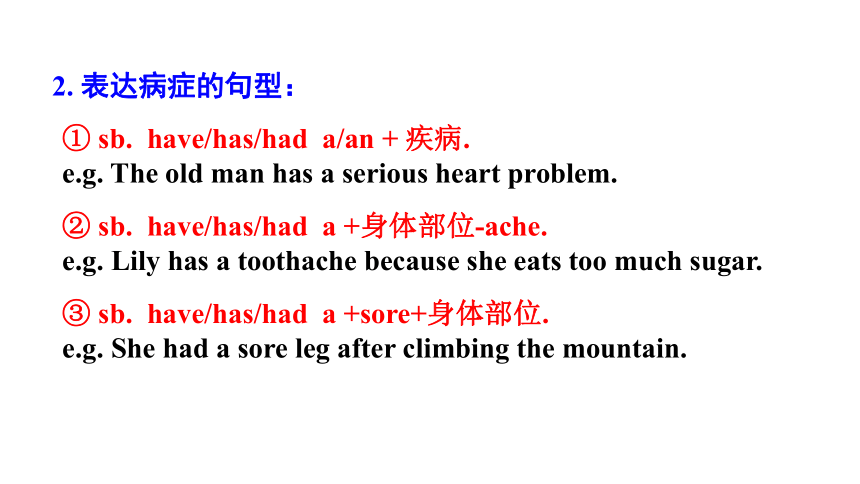
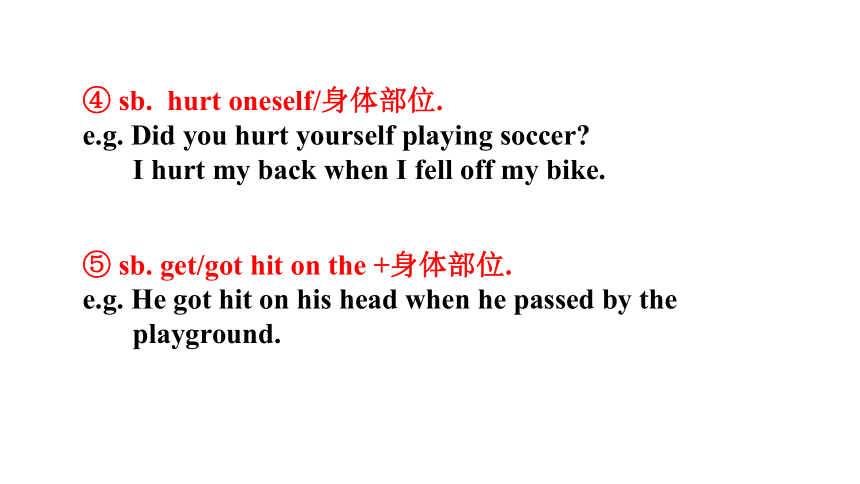
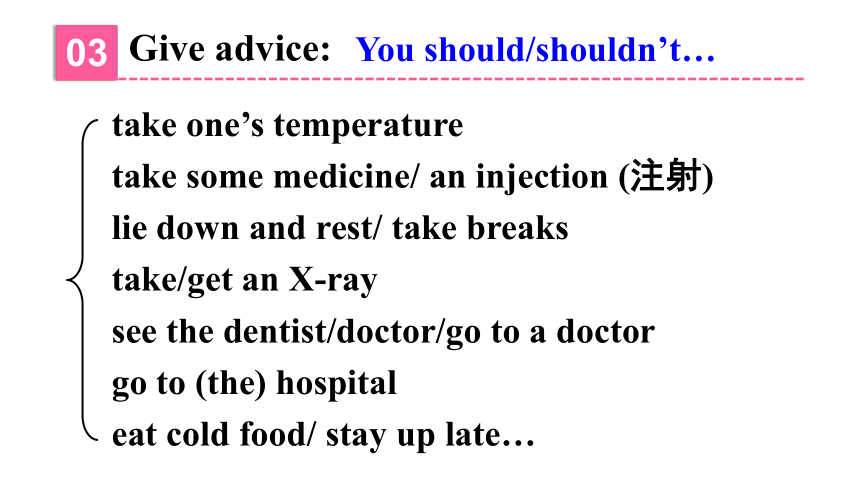
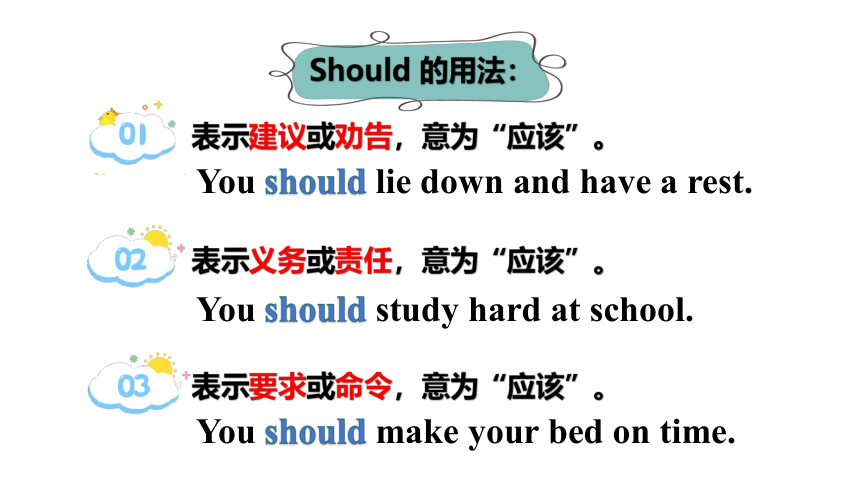
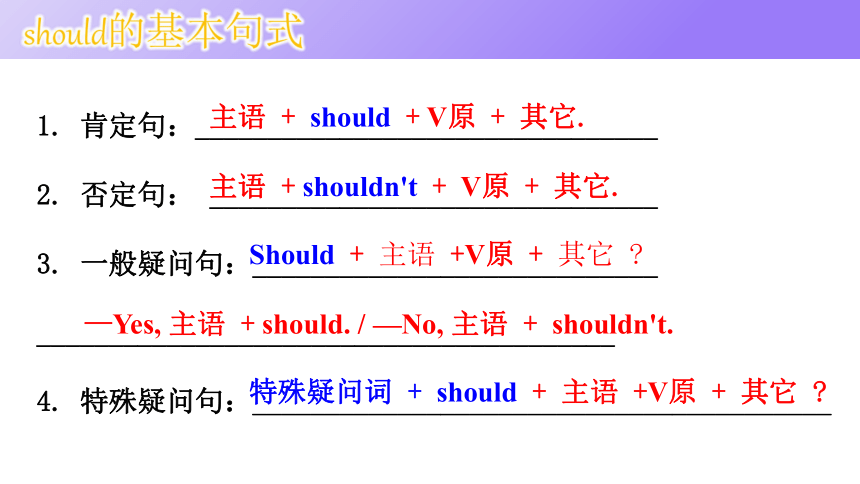
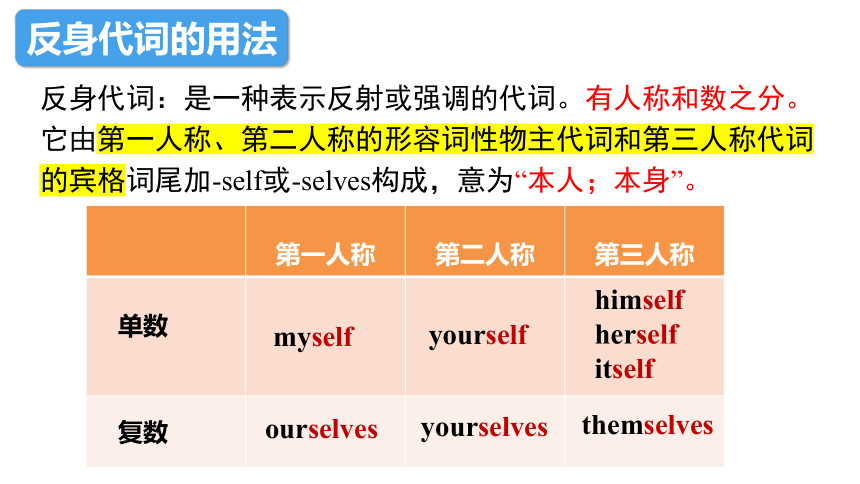
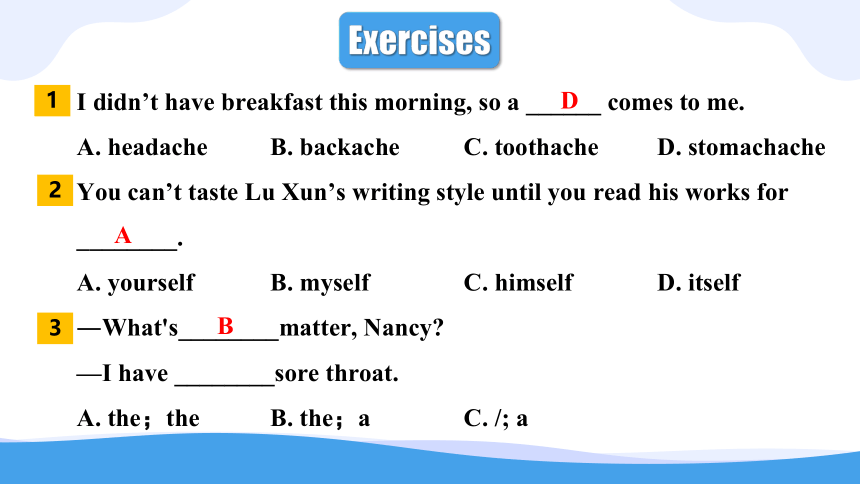
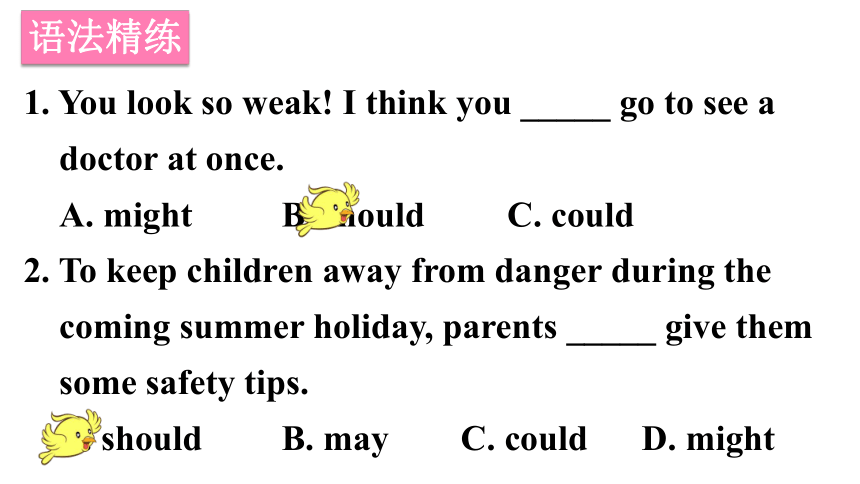
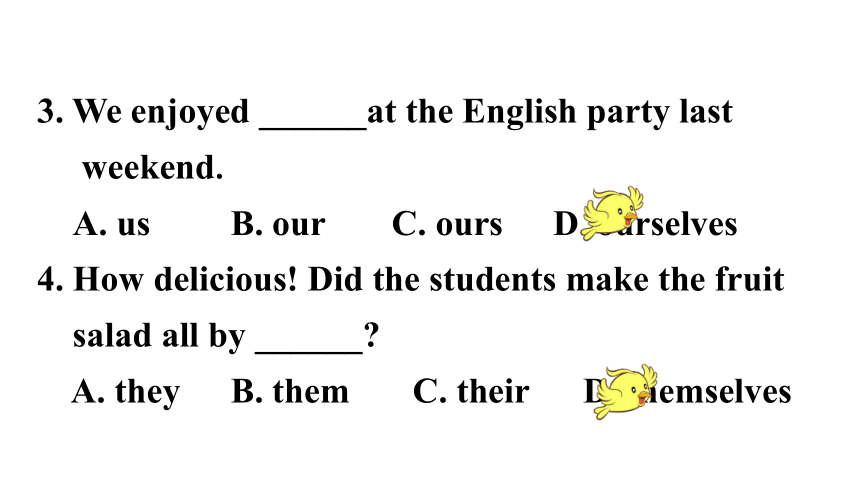

文档简介
(共40张PPT)
八下
期中复习课件
unit 1-unit 5
语法复习
Ask about health problems
01
1. What’s the matter (with…)
2. What’s wrong (with…)
3. What’s the trouble (with…)
4. What happened (to…)
5. Is there anything wrong (with…)
6. Do you have a(n) + 疾病名称
7. Did you catch/get…
询问疾病,不适及突发状况
unit 1
2. 表达病症的句型:
① sb. have/has/had a/an + 疾病.
e.g. The old man has a serious heart problem.
② sb. have/has/had a +身体部位-ache.
e.g. Lily has a toothache because she eats too much sugar.
③ sb. have/has/had a +sore+身体部位.
e.g. She had a sore leg after climbing the mountain.
④ sb. hurt oneself/身体部位.
e.g. Did you hurt yourself playing soccer
I hurt my back when I fell off my bike.
⑤ sb. get/got hit on the +身体部位.
e.g. He got hit on his head when he passed by the
playground.
take one’s temperature
take some medicine/ an injection (注射)
lie down and rest/ take breaks
take/get an X-ray
see the dentist/doctor/go to a doctor
go to (the) hospital
eat cold food/ stay up late…
03
Give advice:
You should/shouldn’t…
Should 的用法:
表示建议或劝告,意为“应该”。
You should lie down and have a rest.
表示义务或责任,意为“应该”。
You should study hard at school.
表示要求或命令,意为“应该”。
You should make your bed on time.
1. 肯定句:________________________________
2. 否定句: _______________________________
3. 一般疑问句:____________________________ ________________________________________
4. 特殊疑问句:________________________________________
should的基本句式
主语 + should + V原 + 其它.
主语 + shouldn't + V原 + 其它.
Should + 主语 +V原 + 其它
特殊疑问词 + should + 主语 +V原 + 其它
—Yes, 主语 + should. / —No, 主语 + shouldn't.
反身代词:是一种表示反射或强调的代词。有人称和数之分。它由第一人称、第二人称的形容词性物主代词和第三人称代词的宾格词尾加-self或-selves构成,意为“本人;本身”。
反身代词的用法
第一人称 第二人称
第三人称
单数
复数
myself
yourself
himself herself
itself
ourselves
yourselves
themselves
I didn’t have breakfast this morning, so a ______ comes to me.
A. headache B. backache C. toothache D. stomachache
You can’t taste Lu Xun’s writing style until you read his works for ________.
A. yourself B. myself C. himself D. itself
―What's________matter, Nancy
—I have ________sore throat.
A. the;the B. the;a C. /; a
A
D
B
1
2
3
Exercises
语法精练
1. You look so weak! I think you _____ go to see a
doctor at once.
A. might B. should C. could
2. To keep children away from danger during the
coming summer holiday, parents _____ give them
some safety tips.
A. should B. may C. could D. might
3. We enjoyed ______at the English party last
weekend.
A. us B. our C. ours D. ourselves
4. How delicious! Did the students make the fruit
salad all by ______
A. they B. them C. their D. themselves
动词不定式
动词不定式是一种非谓语动词形式,在句中不能作谓语,没有人称和数的变化。
基本形式:to+动词原形,有时to可以省略;否定形式:not + 动词不定式。
动词不定式具有名词、形容词和副词的特征,因此可以在句中作主语、宾语、宾语补足语、定语和状语等。
unit 2
状语
宾语
宾语补足语
主语
表语
动词不定式的用法
定语
1.It’s very useful to learn English well.
4.I want to talk with you.
3.They asked him to sing a pop song at the party.
7.My brother often helps me (to) do the housework.
6.His dream is to travel around the world.
5.I want to have something to eat.
2.He will go to Beijing to meet his friends.
分析动词不定式在下列句子中做什么成分。
动词不定式的用法
动词不定式的用法
常接动词不定式作宾语的动词有:
想要 拒绝 忘记 (want, refuse, forget)
需要 努力 学习 (need, try, learn)
选择 同意 帮助 (choose, agree, help)
希望 决定 开始 (hope/wish/expect, decide, begin/start)
Lily wants to find a job as an English teacher in Beijing.
He decided to help the homeless.
动词不定式作宾语
动词不定式的用法
1. I want _________ (become) a teacher one day.
2. It’s very useful _______ (learn) foreign language.
3. He showed me how ______ (use) a computer.
4. She got a job ______ (take) care of an old man.
5. You should run quickly _______ (catch) the bus.
根据提示完成下列句子。
to become
to learn
to use
to take
to catch
情态动词 could 的用法
情态动词 could 构成的句型用于向对方委婉地提出请求或征求对方的许可。它本身不能做谓语,只能和动词原形一起构成谓语。
unit 3
1. 用于委婉地请求别人做某事(提出请求)
常用句型 Could you ( please ) do sth.
肯定答语 OK./Certainly./Of course./With pleasure./
No problem./Yes, sure.等
否定答语 Sorry, I can’t. I have to…/I’m afraid not./ I’m afraid I can’t. I am going to…等
常用句型 Could I do sth.
肯定答语 Yes, you can./Certainly./Yes, please.等
否定答语 Sorry, you can’t./I’m afraid you can’t.等
2. 用于委婉地请求别人允许自己做某事(征求许可)
3. 表示过去的能力,作can的过去式
I could speak English at the age of three. 在我三岁时我能说英语。
4. 表示推测,“可能”
You could be right, but I don’t think you are.
你可能是对的, 但我认为你不是。
5. 表示惊讶,“不可能”,比can't语气弱
He couldn't/can't be fifty. 他不可能50岁。
6. 表示建议
You could go to school by subway. 你可以坐地铁去学校。
情态动词could的功能
1. —_______ you please take the dog for work
— OK, but I have to fold the clothes first.
A. Must B. Should C. Could D. May
2. — Mum, it's too hot. ____I swim in the lake with my friends
— No, you ______. That's too dangerous!
A. Could;mustn't B. Need;couldn't
C. Must;needn't D. Should;can’t
3. —Could you please do the dishes
—________. I cut my finger and I'm trying not to get it wet.
A. Yes, sure B. No problem
C. Sorry, I'm afraid I can't D. That would be fine
C
A
C
单项选择
翻译
1.我可以和朋友一起出去吃饭吗?
________go out for dinner _______________
当然那应该可以。
_____, that should be OK.
2.看完电影后我们可以买些喝的东西吗?
________ get something ________ after the movie
不,你不可以。你明天有场篮球赛。
No, you _____, you have _________________ tomorrow.
3.请问你可以带着狗去散步吗?
__________please take the dog___________
Could I
with my friends
Sure
Could we to drink
can’t a basketball game
Could you
for a walk
Grammar Focus
What did you find out
You look tired. What’s the matter I studied until midnight last night so I didn’t get enough sleep.
What should I do Why don’t you forget about it Although she’s wrong, it’s not a big deal.
What should he do He should talk to his friend so that he can say he’s sorry.
Maybe you could go to his house. I guess I could, but I don’t want to surprise him.
如何提问困难和表达困难
What’s wrong (with sb.)
What’s the matter\trouble (with sb.)
What’s the problem (with sb.)
What happened (to sb.)
What’s up
提问困难句型
表达困难句型
1.I have to study too much so I don’t get enough sleep.
2. I have too much homework so I don’t have any free time to do things I like.
3. My parents don’t allow me to hang out with my friends.
4. I have too many after-school classes.
5. I got into a fight with my best friend.
unit 4
You should/could +v.
Why don’t you +v.
Why not +v.
Could you please +v.
You’d better (not) +v.
Would you mind doing…
What about/How about + n./doing…
表建议的句型:
回答建议的句型:
肯定回答:
Good idea./That’s a good idea./ OK.
/All right./Great./Yes, please./I’d love to.
/No problem./Sure./Of course./Certainly.
否定回答:
I don’t think so./Sorry, I can’t.
/ Sorry, but…
意思 引导状语从句的类型
although
so that
so...that…
until
虽然;尽管
让步状语从句
以便,为了
以至于;结果
结果状语从句
直到……为止;
到……时
时间状语从句
目的状语从句
although, so that及until引导的状语从句
句中位置
although
so that
until
可以放在主句前面,也可以放在主句后面
一般放在主句后,且不用逗号隔开。
常放在主句之后,也可以放在主句之前
although, so that及until引导的状语从句
He got up early this morning so that he could catch the early bus.
Although I gave him some advice, he didn’t take it.
I didn’t wake up until I heard the alarm clock.
1. 尽管她不对,但这也不是什么大不了的事。
Although she’s wrong, it’s not a big deal.
2. 你必须现在就去,以便不会迟到。
You must go now so that you won’t be late.
3. 我做完作业了才上床睡觉。
I won’t go to bed until I finish my homework.
Translation
Exercises
一、单项选择
1.—Why not hold a Chinese Poetry Competition to welcome our school's 70th birthday
—_____ Let's make a plan together in our group.
A. That's all right. B. Yes, please.
C. Good idea. D. Never mind.
2.—I feel stressed from time to time. Could you give me some advice
—____ sharing your worries with your paretns
A. Why don't you B. How about
C. Why not D. Would you like
C
B
3.—Susan, would you like another cake
—_____. I'm full.
A. Yes, please B. My pleasure C. No, thanks D. Not at all
4.—It's nearly lunchtime. How about having some noodles and dumplings
—_____.
A.You're welcome B.That's all right
C. That's nice of you D.That sounds good
C
D
5.The old man leads a simple life, ____ he has a lot of wealth.
A. although B. so C. unless D. because
6.—Lucy, you can't use the phone _____ we are far from the gas (天然气) station.
—OK, I won't do that again.
A. after B. when C. though D. until
A
D
过去进行时(Past continuous tense)
表示过去在某一时刻或某一段时间内正在进行的动作或存在的状态。
定义
结构
主语+be(was/were)+动词的现在分词
I was cooking at 8:00 p.m. yesterday.
unit 5
过去进行时的用法
表示过去某一时刻正在进行的动作:
eg. I was drawing at that time yesterday.
表示过去某一时间段内正在进行的动作:
eg. I was reading last night.
表示一个动作发生时,另一个动作正在进行:
eg. When my mum came home, I was sleeping.
表示一个动作正在进行,另一个动作突然发生:
eg. When I was walking, it rained.
表示两个动作同时进行.
eg. While I was sweeping the floor, she was cooking,
现在分词的构成
1.一般动词在词尾加-ing,如go—going
2.以不发音字母e结尾的动词, 先去掉e, 再加-ing
come — coming make — making write — writing
3.以重读闭音节结尾的动词,如果末尾以一个辅
字母结尾,应先双写这个字母,再加ing,x和w结尾
的除外。
get — getting swim — swimming show — showing
4.以字母y结尾的单词,直接加ing。如:
carrying playing studying
5.以字母ie结尾的动词,变ie为y,再加ing。
die → dying lie →lying
6.以元音字母加e结尾,或以e结尾,且e发音的动词,
直接加- ing。
see — seeing be — being
时间状语标志:
at this(that)time +过去时间
at +过去时间点
those days
from ... to ... +过去时间
when/while 引导的时间状语从句
不同点1 (从句的谓语动词) 不同点2 (主句从句里的动作) 不同点3
(从句的时态)
when 延续性动词 瞬间性动词 同时发生 一前一后 常接一般过去时的从句
while 表状态的延续性动词 同时发生 常接过去进行时的从句
when&while的区别
注意:表示主从句正在进行的动作或状态的对比时多用while:
While she was making a phone call, I was writing a letter.
1. What ______ (be) you ______ (do) when he
arrived
2. Jim _______________ (sleep) when I came in.
3.They _______________ (watch) TV at 8:00
yesterday evening.
4. Now he __________ (read) and ________
(write).
were
doing
was sleeping
were watching
is reading
writing
I. 用所给词的正确形式填空。
Exercises
5. Mother _____________ (wash) clothes when I
_____ (get) home from school yesterday
afternoon.
6. Look, my sister _____ (be) there in the barber
shop. The barber ____________ (cut) her hair.
7. — When _______ you ________ (see) the
accident
— I ______ (see) it fifteen minutes ago.
was washing
got
is
is cutting
did
see
saw
when&while在过去进行时中的使用
主句 从句 例句
过去进行时 when + 一般过去时 I was walking to school when I saw a cat in a tree.
我正在去学校的路上,突然看见一只猫在树上。
一般过去时 while + 过去进行时 David fell while he was riding his bike.
大卫骑自行车时摔倒了。
过去进行时 while + 过去进行时 While Andy was waiting for the bus, he was reading a newspaper. 当安迪在等公共汽车时,他在看报纸。
1. The students (talk) loudly when the teacher_______(come) in yesterday.
2. My mother (clean) the room while my father was reading newspapers.
3. Someone knocked at the door while I (sleep).
were talking
came
was cleaning
was sleeping
八下
期中复习课件
unit 1-unit 5
语法复习
Ask about health problems
01
1. What’s the matter (with…)
2. What’s wrong (with…)
3. What’s the trouble (with…)
4. What happened (to…)
5. Is there anything wrong (with…)
6. Do you have a(n) + 疾病名称
7. Did you catch/get…
询问疾病,不适及突发状况
unit 1
2. 表达病症的句型:
① sb. have/has/had a/an + 疾病.
e.g. The old man has a serious heart problem.
② sb. have/has/had a +身体部位-ache.
e.g. Lily has a toothache because she eats too much sugar.
③ sb. have/has/had a +sore+身体部位.
e.g. She had a sore leg after climbing the mountain.
④ sb. hurt oneself/身体部位.
e.g. Did you hurt yourself playing soccer
I hurt my back when I fell off my bike.
⑤ sb. get/got hit on the +身体部位.
e.g. He got hit on his head when he passed by the
playground.
take one’s temperature
take some medicine/ an injection (注射)
lie down and rest/ take breaks
take/get an X-ray
see the dentist/doctor/go to a doctor
go to (the) hospital
eat cold food/ stay up late…
03
Give advice:
You should/shouldn’t…
Should 的用法:
表示建议或劝告,意为“应该”。
You should lie down and have a rest.
表示义务或责任,意为“应该”。
You should study hard at school.
表示要求或命令,意为“应该”。
You should make your bed on time.
1. 肯定句:________________________________
2. 否定句: _______________________________
3. 一般疑问句:____________________________ ________________________________________
4. 特殊疑问句:________________________________________
should的基本句式
主语 + should + V原 + 其它.
主语 + shouldn't + V原 + 其它.
Should + 主语 +V原 + 其它
特殊疑问词 + should + 主语 +V原 + 其它
—Yes, 主语 + should. / —No, 主语 + shouldn't.
反身代词:是一种表示反射或强调的代词。有人称和数之分。它由第一人称、第二人称的形容词性物主代词和第三人称代词的宾格词尾加-self或-selves构成,意为“本人;本身”。
反身代词的用法
第一人称 第二人称
第三人称
单数
复数
myself
yourself
himself herself
itself
ourselves
yourselves
themselves
I didn’t have breakfast this morning, so a ______ comes to me.
A. headache B. backache C. toothache D. stomachache
You can’t taste Lu Xun’s writing style until you read his works for ________.
A. yourself B. myself C. himself D. itself
―What's________matter, Nancy
—I have ________sore throat.
A. the;the B. the;a C. /; a
A
D
B
1
2
3
Exercises
语法精练
1. You look so weak! I think you _____ go to see a
doctor at once.
A. might B. should C. could
2. To keep children away from danger during the
coming summer holiday, parents _____ give them
some safety tips.
A. should B. may C. could D. might
3. We enjoyed ______at the English party last
weekend.
A. us B. our C. ours D. ourselves
4. How delicious! Did the students make the fruit
salad all by ______
A. they B. them C. their D. themselves
动词不定式
动词不定式是一种非谓语动词形式,在句中不能作谓语,没有人称和数的变化。
基本形式:to+动词原形,有时to可以省略;否定形式:not + 动词不定式。
动词不定式具有名词、形容词和副词的特征,因此可以在句中作主语、宾语、宾语补足语、定语和状语等。
unit 2
状语
宾语
宾语补足语
主语
表语
动词不定式的用法
定语
1.It’s very useful to learn English well.
4.I want to talk with you.
3.They asked him to sing a pop song at the party.
7.My brother often helps me (to) do the housework.
6.His dream is to travel around the world.
5.I want to have something to eat.
2.He will go to Beijing to meet his friends.
分析动词不定式在下列句子中做什么成分。
动词不定式的用法
动词不定式的用法
常接动词不定式作宾语的动词有:
想要 拒绝 忘记 (want, refuse, forget)
需要 努力 学习 (need, try, learn)
选择 同意 帮助 (choose, agree, help)
希望 决定 开始 (hope/wish/expect, decide, begin/start)
Lily wants to find a job as an English teacher in Beijing.
He decided to help the homeless.
动词不定式作宾语
动词不定式的用法
1. I want _________ (become) a teacher one day.
2. It’s very useful _______ (learn) foreign language.
3. He showed me how ______ (use) a computer.
4. She got a job ______ (take) care of an old man.
5. You should run quickly _______ (catch) the bus.
根据提示完成下列句子。
to become
to learn
to use
to take
to catch
情态动词 could 的用法
情态动词 could 构成的句型用于向对方委婉地提出请求或征求对方的许可。它本身不能做谓语,只能和动词原形一起构成谓语。
unit 3
1. 用于委婉地请求别人做某事(提出请求)
常用句型 Could you ( please ) do sth.
肯定答语 OK./Certainly./Of course./With pleasure./
No problem./Yes, sure.等
否定答语 Sorry, I can’t. I have to…/I’m afraid not./ I’m afraid I can’t. I am going to…等
常用句型 Could I do sth.
肯定答语 Yes, you can./Certainly./Yes, please.等
否定答语 Sorry, you can’t./I’m afraid you can’t.等
2. 用于委婉地请求别人允许自己做某事(征求许可)
3. 表示过去的能力,作can的过去式
I could speak English at the age of three. 在我三岁时我能说英语。
4. 表示推测,“可能”
You could be right, but I don’t think you are.
你可能是对的, 但我认为你不是。
5. 表示惊讶,“不可能”,比can't语气弱
He couldn't/can't be fifty. 他不可能50岁。
6. 表示建议
You could go to school by subway. 你可以坐地铁去学校。
情态动词could的功能
1. —_______ you please take the dog for work
— OK, but I have to fold the clothes first.
A. Must B. Should C. Could D. May
2. — Mum, it's too hot. ____I swim in the lake with my friends
— No, you ______. That's too dangerous!
A. Could;mustn't B. Need;couldn't
C. Must;needn't D. Should;can’t
3. —Could you please do the dishes
—________. I cut my finger and I'm trying not to get it wet.
A. Yes, sure B. No problem
C. Sorry, I'm afraid I can't D. That would be fine
C
A
C
单项选择
翻译
1.我可以和朋友一起出去吃饭吗?
________go out for dinner _______________
当然那应该可以。
_____, that should be OK.
2.看完电影后我们可以买些喝的东西吗?
________ get something ________ after the movie
不,你不可以。你明天有场篮球赛。
No, you _____, you have _________________ tomorrow.
3.请问你可以带着狗去散步吗?
__________please take the dog___________
Could I
with my friends
Sure
Could we to drink
can’t a basketball game
Could you
for a walk
Grammar Focus
What did you find out
You look tired. What’s the matter I studied until midnight last night so I didn’t get enough sleep.
What should I do Why don’t you forget about it Although she’s wrong, it’s not a big deal.
What should he do He should talk to his friend so that he can say he’s sorry.
Maybe you could go to his house. I guess I could, but I don’t want to surprise him.
如何提问困难和表达困难
What’s wrong (with sb.)
What’s the matter\trouble (with sb.)
What’s the problem (with sb.)
What happened (to sb.)
What’s up
提问困难句型
表达困难句型
1.I have to study too much so I don’t get enough sleep.
2. I have too much homework so I don’t have any free time to do things I like.
3. My parents don’t allow me to hang out with my friends.
4. I have too many after-school classes.
5. I got into a fight with my best friend.
unit 4
You should/could +v.
Why don’t you +v.
Why not +v.
Could you please +v.
You’d better (not) +v.
Would you mind doing…
What about/How about + n./doing…
表建议的句型:
回答建议的句型:
肯定回答:
Good idea./That’s a good idea./ OK.
/All right./Great./Yes, please./I’d love to.
/No problem./Sure./Of course./Certainly.
否定回答:
I don’t think so./Sorry, I can’t.
/ Sorry, but…
意思 引导状语从句的类型
although
so that
so...that…
until
虽然;尽管
让步状语从句
以便,为了
以至于;结果
结果状语从句
直到……为止;
到……时
时间状语从句
目的状语从句
although, so that及until引导的状语从句
句中位置
although
so that
until
可以放在主句前面,也可以放在主句后面
一般放在主句后,且不用逗号隔开。
常放在主句之后,也可以放在主句之前
although, so that及until引导的状语从句
He got up early this morning so that he could catch the early bus.
Although I gave him some advice, he didn’t take it.
I didn’t wake up until I heard the alarm clock.
1. 尽管她不对,但这也不是什么大不了的事。
Although she’s wrong, it’s not a big deal.
2. 你必须现在就去,以便不会迟到。
You must go now so that you won’t be late.
3. 我做完作业了才上床睡觉。
I won’t go to bed until I finish my homework.
Translation
Exercises
一、单项选择
1.—Why not hold a Chinese Poetry Competition to welcome our school's 70th birthday
—_____ Let's make a plan together in our group.
A. That's all right. B. Yes, please.
C. Good idea. D. Never mind.
2.—I feel stressed from time to time. Could you give me some advice
—____ sharing your worries with your paretns
A. Why don't you B. How about
C. Why not D. Would you like
C
B
3.—Susan, would you like another cake
—_____. I'm full.
A. Yes, please B. My pleasure C. No, thanks D. Not at all
4.—It's nearly lunchtime. How about having some noodles and dumplings
—_____.
A.You're welcome B.That's all right
C. That's nice of you D.That sounds good
C
D
5.The old man leads a simple life, ____ he has a lot of wealth.
A. although B. so C. unless D. because
6.—Lucy, you can't use the phone _____ we are far from the gas (天然气) station.
—OK, I won't do that again.
A. after B. when C. though D. until
A
D
过去进行时(Past continuous tense)
表示过去在某一时刻或某一段时间内正在进行的动作或存在的状态。
定义
结构
主语+be(was/were)+动词的现在分词
I was cooking at 8:00 p.m. yesterday.
unit 5
过去进行时的用法
表示过去某一时刻正在进行的动作:
eg. I was drawing at that time yesterday.
表示过去某一时间段内正在进行的动作:
eg. I was reading last night.
表示一个动作发生时,另一个动作正在进行:
eg. When my mum came home, I was sleeping.
表示一个动作正在进行,另一个动作突然发生:
eg. When I was walking, it rained.
表示两个动作同时进行.
eg. While I was sweeping the floor, she was cooking,
现在分词的构成
1.一般动词在词尾加-ing,如go—going
2.以不发音字母e结尾的动词, 先去掉e, 再加-ing
come — coming make — making write — writing
3.以重读闭音节结尾的动词,如果末尾以一个辅
字母结尾,应先双写这个字母,再加ing,x和w结尾
的除外。
get — getting swim — swimming show — showing
4.以字母y结尾的单词,直接加ing。如:
carrying playing studying
5.以字母ie结尾的动词,变ie为y,再加ing。
die → dying lie →lying
6.以元音字母加e结尾,或以e结尾,且e发音的动词,
直接加- ing。
see — seeing be — being
时间状语标志:
at this(that)time +过去时间
at +过去时间点
those days
from ... to ... +过去时间
when/while 引导的时间状语从句
不同点1 (从句的谓语动词) 不同点2 (主句从句里的动作) 不同点3
(从句的时态)
when 延续性动词 瞬间性动词 同时发生 一前一后 常接一般过去时的从句
while 表状态的延续性动词 同时发生 常接过去进行时的从句
when&while的区别
注意:表示主从句正在进行的动作或状态的对比时多用while:
While she was making a phone call, I was writing a letter.
1. What ______ (be) you ______ (do) when he
arrived
2. Jim _______________ (sleep) when I came in.
3.They _______________ (watch) TV at 8:00
yesterday evening.
4. Now he __________ (read) and ________
(write).
were
doing
was sleeping
were watching
is reading
writing
I. 用所给词的正确形式填空。
Exercises
5. Mother _____________ (wash) clothes when I
_____ (get) home from school yesterday
afternoon.
6. Look, my sister _____ (be) there in the barber
shop. The barber ____________ (cut) her hair.
7. — When _______ you ________ (see) the
accident
— I ______ (see) it fifteen minutes ago.
was washing
got
is
is cutting
did
see
saw
when&while在过去进行时中的使用
主句 从句 例句
过去进行时 when + 一般过去时 I was walking to school when I saw a cat in a tree.
我正在去学校的路上,突然看见一只猫在树上。
一般过去时 while + 过去进行时 David fell while he was riding his bike.
大卫骑自行车时摔倒了。
过去进行时 while + 过去进行时 While Andy was waiting for the bus, he was reading a newspaper. 当安迪在等公共汽车时,他在看报纸。
1. The students (talk) loudly when the teacher_______(come) in yesterday.
2. My mother (clean) the room while my father was reading newspapers.
3. Someone knocked at the door while I (sleep).
were talking
came
was cleaning
was sleeping
同课章节目录
- Unit 1 What's the matter?
- Section A
- Section B
- Unit 2 I'll help to clean up the city parks.
- Section A
- Section B
- Unit 3 Could you please clean your room?
- Section A
- Section B
- Unit 4 Why don't you talk to your parents?
- Section A
- Section B
- Unit 5 What were you doing when the rainstorm came
- Section A
- Section B
- Review of Units 1-5
- Unit 6 An old man tried to move the mountains.
- Section A
- Section B
- Unit 7 What's the highest mountain in the world?
- Section A
- Section B
- Unit 8 Have you read Treasure Island yet?
- Section A
- Section B
- Unit 9 Have you ever been to a museum?
- Section A
- Section B
- Unit 10 I've had this bike for three years.
- Section A
- Section B
